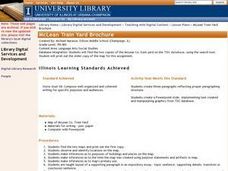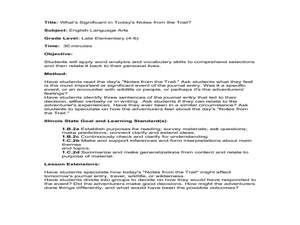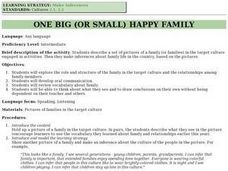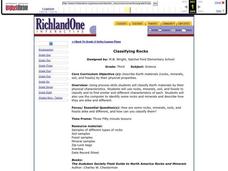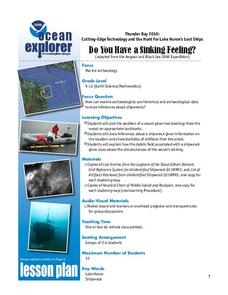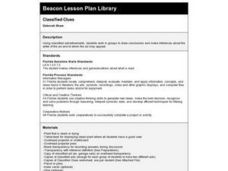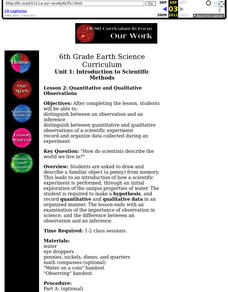Teaching for Change
Selma in Pictures: Socratic Seminar
Photographs from the freedom movement in Selma, Alabama serve as the basis of two Socratic Seminars. Class members prepare for the seminars by closely observing the images, form a hypothesis, and use evidence from photo to support a...
Curated OER
Plastics and Rubber: What's the Difference?
Learners observe how to classify things into groups based on physical properties. In this plastic and rubber lesson students group and sort items to help them to better identify properties.
Curated OER
GROWING PLANTS UNIT
Students predict outcomes of scientific experiment,.conduct a scientific experiment with control groups, and plant seeds to observe, measure, and compare growth across groups. They gather, record, analyze, and share data with other...
Curated OER
Birds and Birdfeed
Fourth graders examine the basic survival needs of birds before examining a suet ball as an example of what birds eat. They conduct an experiment with pine cones, bird seed, vaseline, and peanut butter. By observing the birds, they...
Curated OER
Statistics and Shopping
Students examine statistics and data analysis concepts from the practical questions that arise in everyday life.
Curated OER
McLean Train Yard
Young scholars conduct online research and incorporate graphics and maps into a Powerpoint presentation that details life at the McLean train yard in its heyday.
Curated OER
Traveling With Limited Funds; A Tree Grows in Brooklyn
Students participate in a pre-reading activity which helps them see what it would be like to live in poverty. In this reading comprehension lesson, students make a list of items they take on a trip considering they have very limited...
Curated OER
Cities and Seasons
Students explore how satellite images show seasonal changes in seven cities in North and South America. Through a sequence of images, they study the green-up and brown-down of the seasons and how seasons change over time. Afterwards,...
Curated OER
Eating Healthy
Students review healthy eating habits, and demonstrate reading comprehension skills, including reading strategies, inference, literal meaning, and critical analysis.
Curated OER
Mammal Teeth and Skulls-Adaptations and Identification
Student study the differentiation of teeth and skull adaptations in mammals in general and 14 common terrestrial mammals. They explore more about these mammals, their natural history, their adaptations and their identification through an...
Curated OER
What's Significant in Today's Notes from the Trail?
For this lesson, you will need access to "Notes from the Trail." Your learners will read the day's text, and identify the most important or significant event in the journal entry. Not many prompting questions are provided, and some of...
Curated OER
The Study of the Spanish-Speaking People of Texas: Daily Life
Young scholars analyze the different ways that photography helps historians understand the lives of people who lived in the past. They examine images from Russell Lee's photo essay and discuss how Texas' has changed from an agrarian to...
Curated OER
Collecting, organizing and comparing data for cellular telephone buying and calculating average, and median price and best deal per cost.
Students research data and develop statistical methods such as mean and median price and make convincing arguments as powerful ways for decision making.
Curated OER
The Study of the Spanish-Speaking People of Texas: Understanding Primary Sources
High schoolers analyze Russell Lee's photo essay as a sign of segregation in Texas. They consider the differences between primary and secondary sources and how historians use these sources.
Curated OER
How Can You Study Things You Can’t See Like: Atoms?
Students simulate how scientists studied things they can't see like atoms. In this chemistry lesson, students predict what is inside the numbered obsertainers. They design a way to investigate what's inside without opening it.
Curated OER
One Big Happy Family
Students will explore the role and structure of the family in the target culture and the relationships among family members. The skills help learners make connections to language because the information of the lesson uses personal examples.
Curated OER
Classifying Rocks
Third graders classify rocks. In this rocks and minerals lesson plan, 3rd graders observe, make inferences and conclusions about rocks, minerals, soil and fossils.
Curated OER
Hierarchical Organization in Biology: Students Presentations of Neurobiology
Young scholars gather (research) information on neuron structure and action potential. Students are guided to make inferences about the synapse and its relationship to neurotransmitter release and action. They are also guided to make...
Curated OER
Location, Location, Location: Using a Grid to Determine Context
Seventh graders are introduced to making inferences about artifacts. Using a grid system, they locate the artifacts and determine where they originated from. They use this information to make conclusions about the way people lived...
Curated OER
Do You Have a Sinking Feeling?
Students explore how marine archaeologists use data to draw inferences about shipwrecks. In this marine archeology lesson students plot the position of a vessel, draw inferences about a shipwreck and explain the possible...
Curated OER
Classified Cues
Middle schoolers analyze classified advertisements to make inferences about who wrote the ad and who may find the ad appealing. They write their own classified ads based on what they have learned.
Curated OER
Introduction to Scientific Methods
Sixth graders distinguish between an observation and an inference distinguish between quantitative and qualitative observations of a scientific experiment. They record and organize data collected during an experiment.
Curated OER
Shipwreck Mystery
Students study web pages on a shipwreck then locate where this took place on a map. In this marine archaeologist activity students examine what clues archaeologists use to find the location of a shipwreck and what they might...
Curated OER
Civil War Music - Irish Folk Songs
Students determine what it was like to serve as an Irish-American in the American Civil War. For this Irish folk song lesson, students use the provided worksheets to analyze selected Irish folk songs and make inferences about war...
Other popular searches
- Teaching Inference Skills
- Inference Skills First Grade
- Reading Inference Skills
- Powerpoint Inference Skills
- Inference Skills in Reading
- Inference Skills Worksheet
- Science Inference Skills
- Inference Skills Sixth Grade





